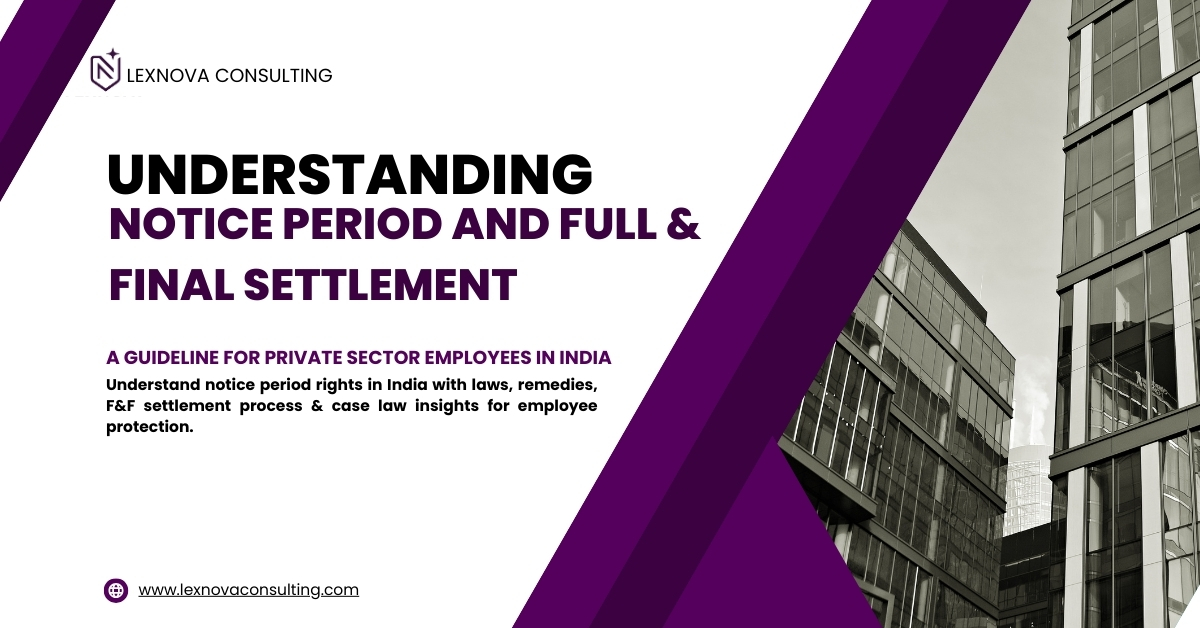Introduction
Navigating the end phase of employment can be one of the most challenging experiences in a private-sector job. Employees often grapple with ambiguous job exit terms, pending compensation, and delayed settlements. Understanding your notice period rights and rights to a full & final settlement (F&F) is critical to safeguard your earnings and reduce stress. This blog walks you through your legal entitlements, landmark judgments, actionable remedies, and comparative global practices
Understanding Notice Period Rights
What does the “notice period” mean?
A notice period refers to the time between resigning (or being asked to leave) and the actual separation from service. It gives both parties time to manage transition tasks.
Is a notice period legally required in India?
No single national law mandates notice periods for private-sector roles. It depends on:
| Employment contracts (most common). |
| State Shops & Establishments Acts. |
| Industrial Disputes Act (IDA), 1947, applicable if the employee qualifies as a “workman” (defined in Section 2(s)) |
Reasonableness of Notice
In Sanjay Jain v. National Aviation Co. of India Ltd., 2018, the SC reaffirmed that an employee can resign after a 30-day notice, provided it’s reasonable and within contractual terms.
The Public Access Law note confirms that Indian law allows employers and employees to negotiate terms, including waivers or payments in lieu of notice.
Statutory Notice Periods for Workmen
Under certain conditions, employers must provide:
- 30–90 days’ notice depending on tenure and state laws
Employee Rights During the Notice Period
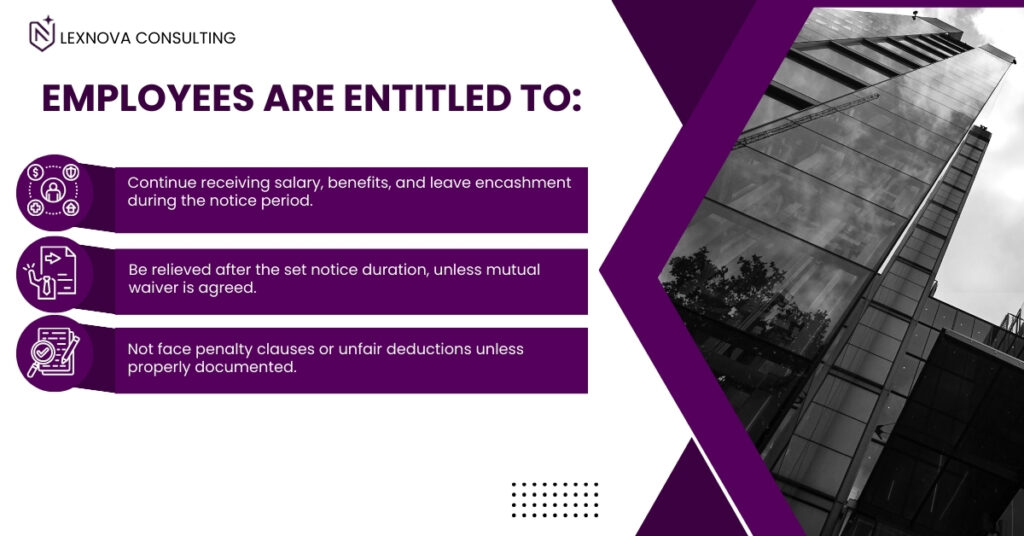
Employer Rights During the Notice Period
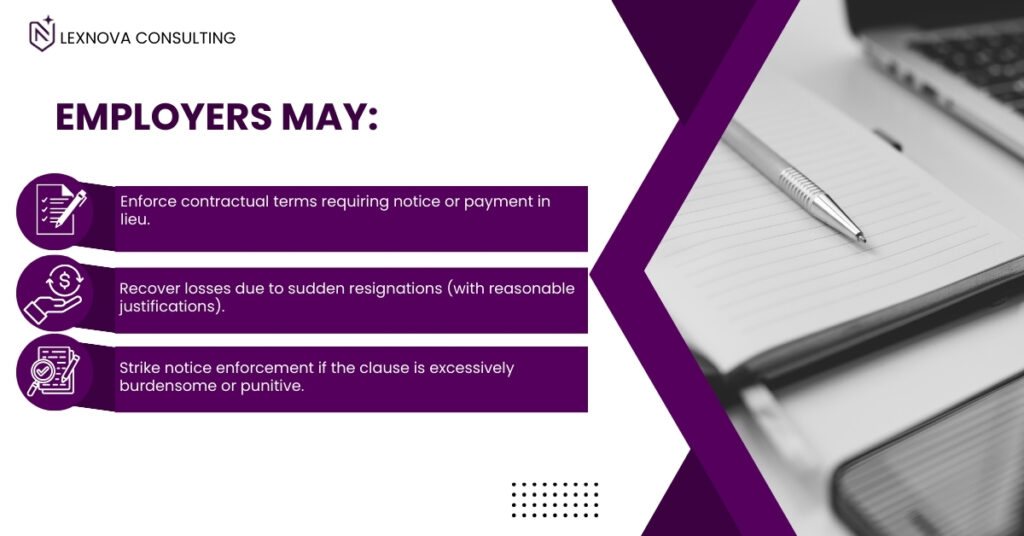
Full & Final Settlement Rights
What is Full & Final (F&F) Settlement?
F&F settlement is the process of settling all financial dues: unpaid salary, leave encashment, gratuity (if applicable), benefits, and deductions. It formalises employee separation.
Statutory Backing
| The Payment of Wages Act, 1936 mandates wages paid no later than the second working day after separation, emphasising timely F&F payments. |
| The Payment of Gratuity Act, 1972 requires payment after 5+ years of service. |
Judicial Views on F&F Settlements
In Bennett Coleman & Co. v. Punya Priya Das Gupta, the SC ruled that F&F settlements don’t nullify pending dues like leave encashment unless explicitly waived.
Recent Precedent
In Dasrath Chaudhary v. West Bengal State, Calcutta HC held delays in settlement fall within civil law and not criminal breach of trust, underscoring employee rights to due settlements.
Jurisdictional Variations in Indian Notice Period Rules
While the broad framework of notice period rights is shaped by employment contracts, India’s federal labour law structure means that state-specific statutes also apply. These create significant variations across industries and geographies.
A. Shops & Establishments Acts
Each state has its own Shops & Establishments Act. For example:
| Delhi Shops & Establishments Act, 1954: Employers must provide at least 30 days’ notice for employees who have completed three months’ service. |
| Maharashtra Shops & Establishments Act, 2017: Mandates 30 days’ notice for managerial staff, with proportionate pay if notice isn’t served. |
| Tamil Nadu Act: Requires one month’s notice or wages in lieu after six months of continuous service. |
B. Industrial Disputes Act (IDA), 1947
Applicable where the employee qualifies as a “workman.” Section 25F requires:
| One month’s notice (for workmen with <1 year service), or |
| Three months’ notice (for workmen with >1 year), along with retrenchment compensation. |
C. Court Interpretations
Courts have consistently held that contractual terms cannot override statutory protections. In S.K. Singh v. Labour Court, 2015, the Allahabad HC clarified that even if a contract stipulates a harsher term, statutory notice under IDA prevails.
Takeaway: Employees must check not just contracts, but also state-specific legislation to assert rights.
Notice Period Issues in IT Sector, Startups & Gig Economy
A. IT & ITES Industry
Notice periods in IT are often 90 days, longer than statutory requirements. While upheld by courts, such extended periods have been criticized as unreasonable restraints on trade under Section 27 of the Indian Contract Act, 1872.
Case law: TCS v. Vinod Joseph, 2019 (Madras HC) – court upheld a 90-day notice clause but stated that employees cannot be “bonded labour.”
B. Startups & SMEs
Startups often have no structured HR policy. Employees face arbitrary deductions if they leave early. Without formal documentation, enforcing notice period rights becomes harder.
C. Gig Economy (Swiggy, Zomato, Ola, etc.)
Gig workers often operate as “independent contractors.” Contracts rarely define notice periods. However, tribunals like the UK Supreme Court in Uber BV v. Aslam (2021) recognized gig workers as employees for benefits. India has yet to adopt this approach, but the Code on Social Security, 2020 hints toward protections.
Takeaway: IT and gig employees must be vigilant about contracts, but Indian courts may step in if terms are oppressive.
Employer Malpractices & Employee Protections
Despite legal frameworks, many employers indulge in malpractices:
| Withholding F&F settlements beyond statutory deadlines. |
| Forcing longer notice than agreed, especially when attrition is high. |
| Blacklisting employees who resign without notice, affecting re-employment. |
| Unlawful deductions like “training costs” or “bond recovery,” even where unenforceable. |
Judicial Stance
- In M/s Sicpa India Ltd. v. Shri Manas Pratim Deb (2009), the SC ruled that recovery of “training costs” requires proof of actual expense, not arbitrary deductions.
- In Larsen & Toubro Ltd. v. State of UP, 2014, courts held that blacklisting employees without due process amounts to unfair labour practice.
Employee Protections
- Lodge a complaint with the Labour Commissioner.
- Approach the wages authority under the Payment of Wages Act for withheld dues.
- File a civil suit for recovery with interest.
- Escalate to high courts under writ jurisdiction if there is a public law element.
Legal Remedies for Employees
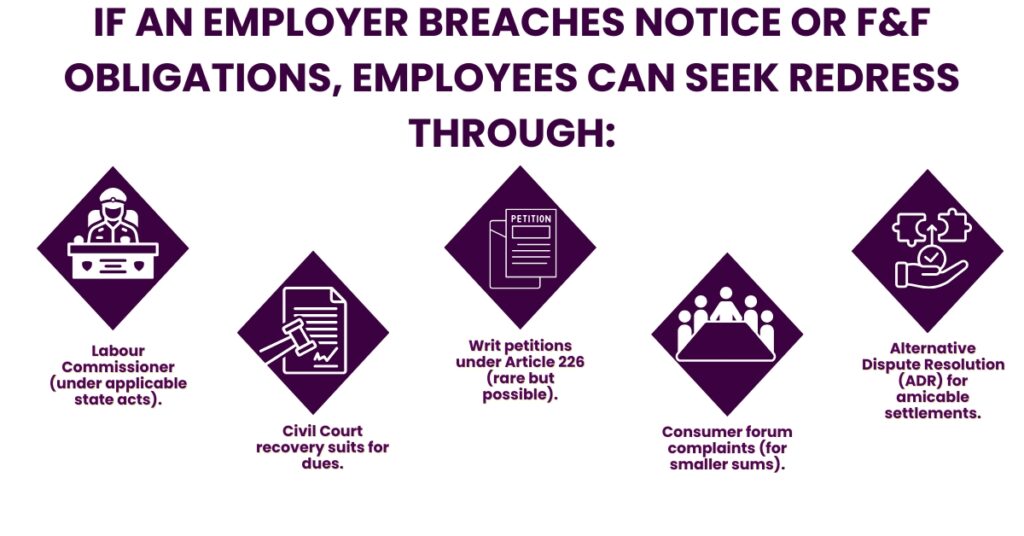
Landmark Case Laws
| Case | Summary |
| Sanjay Jain v. NACI Ltd., 2018 | SC upheld effectiveness of 30-day resignation notice. |
| Dasrath Chaudhary & Another v. West Bengal, 2025 | HC ruled settlement delay doesn’t constitute criminal offence. |
| Air India Express Ltd. v. Gurdarshan Kaur Sandhu, 2019 | SC affirmed variable notice periods and need for waiver/protection. |
Comparing International Practices
| Country | Notice Requirement | F&F Timeline |
| UK | Statutory minimum + contract; 1 week min, longer with tenure | Typically within salary cycle |
| Canada (Ontario) | Mandatory after 3 months | 7–30 days depending on policy |
| UAE | ≤6 months probation; specific notice rules | Employer must settle on last working day |
| US (At-will) | No formal notice | Varies by contract |
These comparisons highlight India’s need for statutory clarity on notice period rights.
Comparative Global Lessons & Indian Reform Needs
While Indian law remains fragmented, other jurisdictions have clearer frameworks:
| UK | Employment Rights Act, 1996 lays down minimum notice rules. |
| Germany | Kündigungsschutzgesetz requires notice based on years of service. |
| Singapore | Employment Act mandates notice ranging from 1–4 weeks, proportionate to service. |
Why India Needs Reform
| Standardization | Currently, contracts dominate, leading to disparity. |
| Timely settlements | No unified statute for F&F timelines. |
| Protection for white-collar employees | IDA applies mainly to workmen, leaving private professionals exposed. |
Recommendations
- A centralized law mandating uniform notice and F&F rules for all employees.
- Statutory penalties on employers delaying settlements.
- Recognition of gig and IT workers as “employees” under labour law.
Employee Awareness & Preventive Strategies
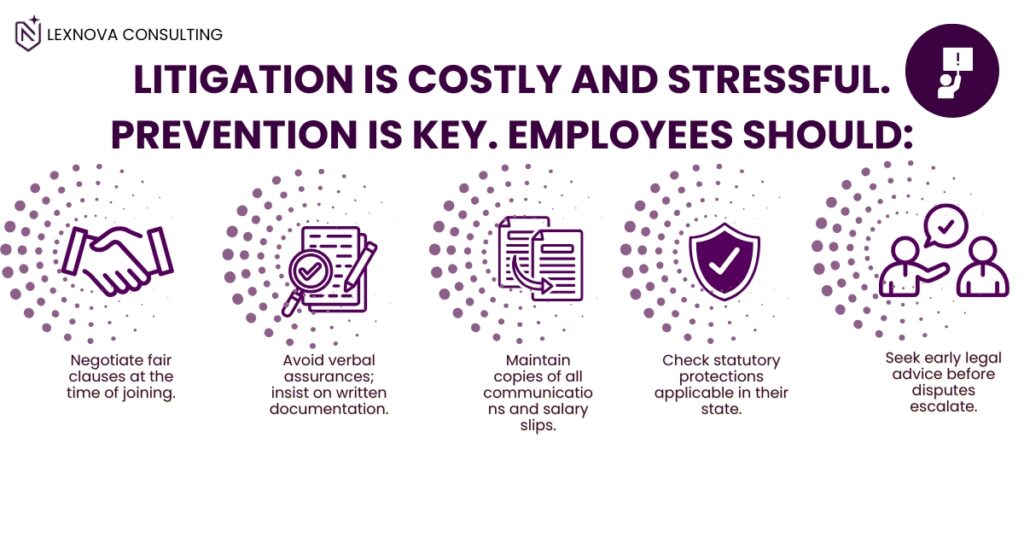
Pro Tip: Employees can also use RTI (Right to Information) to access labour department compliance details of employers, strengthening their case.
Employee Best Practices
- Serve notice in writing with proof of receipt.
- Collect settlement acknowledgment documents.
- Negotiate notice waivers or payments, especially during urgent exits.
- Act promptly if F&F is overdue.
- Retain pay slips, communication, settlement letters for legal use.
Step-by-Step Legal Recourse for Employees
Employees often hesitate to enforce their notice period rights due to fear of litigation costs. Here’s a step-wise, practical guide:
1. Review your documents
- Employment contract
- Appointment letter
- Payslips, emails, HR communications
2. Send a legal notice
- Cite breach of contract and demand dues within 15 days.
- Attach supporting documents.
3. Approach Labour Commissioner
- File under the Shops & Establishments Act or IDA (if “workman”).
- Commissioner can summon employer and direct settlement.
4. File civil recovery suit
- Under Order 37 CPC (summary suits for money recovery).
- Typically resolved faster (12–18 months).
5. Use arbitration clause (if present).
- Invoke under Arbitration & Conciliation Act, 1996.
6. Escalation
- If the amount is small (<₹50,000), consumer courts can be faster.
- For larger disputes, writ petitions may be invoked.
Template (sample legal notice extract):
“This is to notify that you are in breach of Clause X of my employment contract by unlawfully withholding my salary and settlement dues. You are hereby called upon to release the pending amount within 15 days, failing which legal action shall be initiated…”: Notice Period and Full & Final Settlement in India: Employee Rights & Legal RemediesConclusion
Protecting your notice period rights and securing a fair full & final settlement are essential steps to conclude employment gracefully. These rights are enforceable through contract law, labour regulations, and judicial guidance, even in India’s fragmented legal landscape. Notice period rights and full & final settlements are not just technical HR issues, but crucial safeguards for employee dignity. With fragmented laws, employer malpractices, and lack of uniformity, India urgently needs reform.
At LexNova Consulting, we’re committed to strengthening employee protections through accessible, accurate legal guidance, our mission is to close this awareness gap. This extended blog ensures employees across IT, startups, and traditional sectors know not only their rights, but also practical steps to enforce them. This blog is part of our broader Employee Rights Series, following Probation Period Rights, and aims to equip you with actionable knowledge. Stay informed! You don’t have to endure employment exit uncertainty alone.
References
Get In Touch
For personalised legal help on notice period issues or F&F disputes make an appointment with our legal experts today.
Disclaimer: This blog provides general information and relies on verified sources, including judgments and labour regulations. It does not constitute legal advice. For advice tailored to your situation, consult a qualified legal professional.

